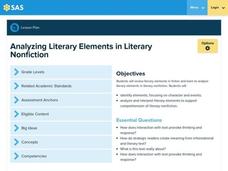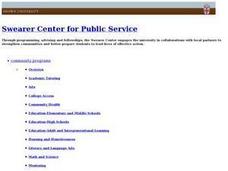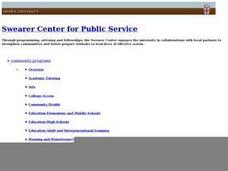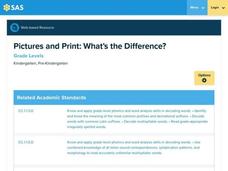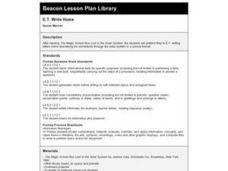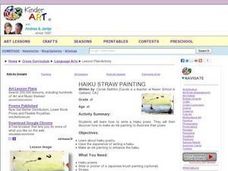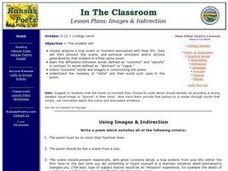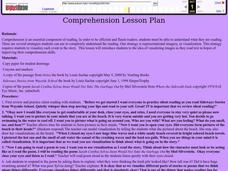Curated OER
Always My Dad
In this Always My Dad worksheet, students read the book Always My Dad and answer short answer questions about it. Students answer 10 questions total.
Pennsylvania Department of Education
Analyzing Literary Elements in Literary Nonfiction
Fourth graders identify the literary elements of a nonfiction text. In this literary elements lesson, 4th graders read the text Piano Starts Here--The Young Art Tatum and fill in a chart that includes the events from the book....
Manchester University
Alliteration
Kids create cool clauses selecting a single starting sound. Ah, alliteration.
Curated OER
Haiku Wrap Up
Students create a haiku about the land formations they've studied. In this haiku lesson, students identify the metaphor and meaning of a given haiku, brainstorm comparisons for a landform photo as a class and choose one to use in a...
Curated OER
See Me, Feel Me, Hear Me, Describe Me!
Fifth graders read the poem "Root Cellar" and then close their eyes and describe objects that are placed in their hands.
Curated OER
What Smells?
Students read the poem "Light" together and then discuss how poetry can come from anywhere.
Curated OER
Line and Description
Fifth graders, in order to explore different forms of poems, are introduced to line breaks and description through "The Pickerel" guided visualization.
Curated OER
How Animals Bond
In this animals lesson plan, young scholars students write a description about a pet or animal that they know. They include details that would help someone who has never met their animal feel like they know it already. Artwork about...
Curated OER
Sonnet Form
Pupils explore the sonnet form. In this lesson on sonnet form, students explore various sonnets and how a sonnet can range from conventional to experimental.
Pennsylvania Department of Education
Pictures and Print: What's the Difference?
Students watch a PowerPoint presentation. In this early literacy lesson, students watch a PowerPoint presentation describing print from pictures and the difference between the two.
Curated OER
Tuck Everlasting
Students use a rubric given to them to answer questions about the novel Tuck Everlasting. They may have to find ten words that are new to them, complete a Venn Diagram, respond to given prompts or complete a survey. The students...
Curated OER
Practical Criticism
High schoolers analyze the verbal devices through which poems make meaning; to compare one's personal interpretation of a poem with the personal interpretations of others; to develop standards of literary judgment.
Curated OER
Snap a Picture
Students practice using visualization to aid in their reading comprehension. While completing a read aloud of a selected poem, the instructor models visualizing images from the poem. Independently, students read a chapter from a...
Curated OER
Imagine This
Students practice visualizing as they read to aid comprehension. They then read a chapter in their history book and visualize what they read so that they can answer comprehension questions about the chapter.
Curated OER
E.T. Write Home
Students read the book, The Magic School Bus Lost in the Solar System, and discuss the planets visited by the characters in the book. They write journal entries from the viewpoint of E.T., writing letters home describing his travels in...
Curated OER
English Literature: An Overview
Relate literary works and authors to the major themes of English literature from the Anglo-Saxon period through the 20th century. Working in groups, high schoolers will evaluate period philosophy, religion, and politics that influenced...
Curated OER
Haiku Straw Painting
Students explore haiku poetry, have the experience of writing a haiku, and make an ink painting to enhance the haiku.
Curated OER
Images and Indirection
Students closely analyze a true event or moments associated with their life, then present the scene, and personal emotions and/or actions generated by that incident in a free verse poem. They learn the difference between words defined...
Curated OER
Two Haiku
Eighth graders, in pairs, discuss what they already know about Haiku poetry. They try to remember the rules, history, and focus of traditional Japanese Haiku. they read more examples of Haiku and then write and illustrate their own...
Curated OER
Do You See What I See?
Learners participate in a reading skills lesson to improve reading comprehension. The skill of visualization is taught and practiced to help them better understand the plot of a story.
Curated OER
Comprehension
Students identify that comprehension is an essential component or reading and in order to be efficient and fluent readers. They interpret what they have read through various strategies. Finally, students use one of the strategies,...
Curated OER
Buh, Buh, Buh B!!
Students complete a variety of activities related to the letter "B." As a class they recite a tongue twister, then trace and write the letter "B." Students identify the words in the poem that contain the /b/ sound and draw a picture of...
Curated OER
Fairytale Cake
Students recreate characters from the story, "The Fairytale Cake." In this fairy tale characterization lesson, students first listen to fairy tales read aloud. They then use play dough and plastic bowls as pretend "cakes and icing", and...



